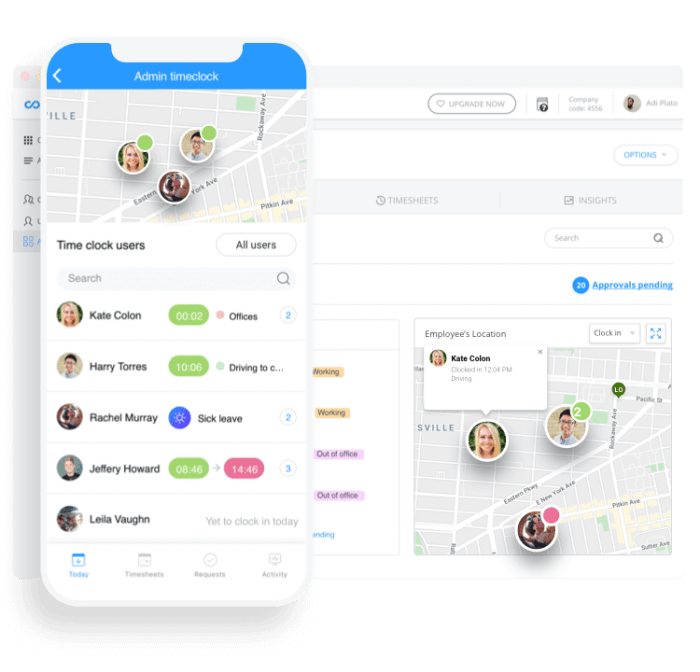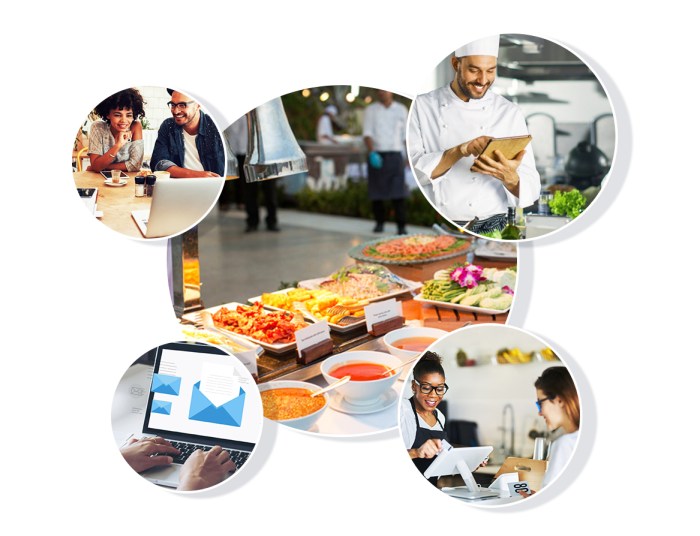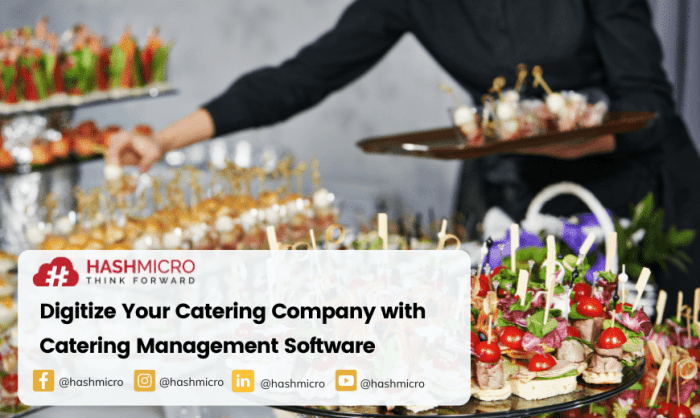Sales and catering software revolutionizes the hospitality industry, offering a powerful suite of tools designed to streamline operations and enhance customer experience. These sophisticated systems manage reservations, track events, handle billing, and provide valuable reporting, ultimately boosting efficiency and profitability. Effective software integrates seamlessly with other business systems, improving communication and collaboration between sales teams, catering staff, and clients.
From initial client contact to final invoice, sales and catering software automates many time-consuming tasks. This allows staff to focus on building relationships and delivering exceptional service, leading to increased client satisfaction and repeat business. The ability to manage multiple events concurrently, track inventory, and generate customized proposals are key features that contribute to a more organized and profitable operation.
In the dynamic world of hospitality, efficiency is paramount. For businesses specializing in sales and catering, managing bookings, client communication, and event logistics can quickly become overwhelming. This is where sales and catering software steps in, offering a centralized platform to streamline operations and boost profitability. This comprehensive guide delves into the key features, benefits, and considerations when choosing the right sales and catering software for your business.

Source: connecteam.com
Understanding the Power of Sales and Catering Software
Sales and catering software goes beyond simple calendar management. It’s a robust solution designed to manage the entire lifecycle of a catering event, from initial inquiry to final invoice. This includes managing leads, coordinating with clients, tracking inventory, managing staff, and generating reports. The right software can significantly reduce administrative burden, allowing your team to focus on delivering exceptional client experiences.
Key Features of Effective Sales and Catering Software:
- Lead Management: Efficiently capture and track leads from various sources (website forms, phone calls, email inquiries).
- Event Scheduling and Calendar Management: Visualize bookings, manage conflicts, and optimize resource allocation.
- Client Relationship Management (CRM): Maintain detailed client profiles, track communication history, and personalize interactions.
- Proposal and Contract Generation: Quickly create professional proposals and contracts with customizable templates.
- Menu Management: Easily update and manage menus, pricing, and dietary options.
- Inventory Management: Track inventory levels, manage orders, and minimize waste.
- Staff Scheduling: Assign staff to events, manage shifts, and track employee availability.
- Financial Management: Track expenses, manage invoices, and generate reports on revenue and profitability.
- Reporting and Analytics: Gain valuable insights into sales trends, client preferences, and operational efficiency.
- Integration Capabilities: Seamlessly integrate with other business systems, such as accounting software and point-of-sale (POS) systems.
Benefits of Implementing Sales and Catering Software
Investing in sales and catering software offers numerous benefits that can significantly impact your business’s bottom line and operational efficiency.
Increased Efficiency and Productivity:
Automating repetitive tasks, such as proposal generation and invoice creation, frees up valuable time for your team to focus on higher-value activities, like client relationship building and event planning. This leads to increased overall productivity and efficiency.
Improved Client Communication and Satisfaction:, Sales and catering software
Centralized communication tools and client profiles ensure that all communication is consistent and readily accessible. This enhances client satisfaction and fosters stronger relationships.
Reduced Errors and Improved Accuracy:
Automating tasks minimizes the risk of human error, leading to more accurate bookings, invoices, and reports. This contributes to improved financial management and reduces costly mistakes.
Enhanced Revenue Generation:
By optimizing resource allocation, improving sales processes, and providing better client service, sales and catering software can directly contribute to increased revenue generation.
Better Data-Driven Decision Making:
Comprehensive reporting and analytics capabilities provide valuable insights into sales trends, client preferences, and operational efficiency. This empowers data-driven decision-making, allowing for strategic improvements and growth.
Choosing the Right Sales and Catering Software: Key Considerations
Selecting the appropriate software involves careful consideration of several factors. Your choice should align with your specific business needs, budget, and technological capabilities.
Scalability and Flexibility:
Ensure the software can adapt to your business’s growth and changing needs. Consider features like user permissions, multi-location management, and integration capabilities.
User-Friendliness and Ease of Use:
Opt for software with an intuitive interface that is easy for your team to learn and use. Training and support resources should also be readily available.
Integration with Existing Systems:
Check for compatibility with your existing accounting software, POS systems, and other relevant business tools. Seamless integration streamlines workflows and prevents data silos.
Cost and Pricing Models:
Consider the initial investment, ongoing subscription fees, and any additional costs associated with implementation, training, and support.
Customer Support and Reviews:
Research the vendor’s reputation, customer support options, and online reviews. Reliable customer support is crucial for resolving issues and ensuring smooth operation.
Frequently Asked Questions (FAQ)
- Q: What are the most important features to look for in sales and catering software?
A: Essential features include lead management, event scheduling, CRM capabilities, proposal generation, menu management, and reporting and analytics. - Q: How much does sales and catering software cost?
A: Pricing varies widely depending on features, vendor, and subscription model. Expect a range from basic monthly fees to more comprehensive packages with higher costs. - Q: Can sales and catering software integrate with my existing systems?
A: Many solutions offer integration capabilities with accounting software, POS systems, and other business tools. Check the vendor’s specifications for compatibility. - Q: How long does it take to implement sales and catering software?
A: Implementation time varies depending on the complexity of the software and your business’s needs. Expect a timeframe ranging from a few weeks to several months. - Q: What kind of training is provided with sales and catering software?
A: Most vendors offer training resources, including online tutorials, webinars, and dedicated support staff. The extent of training varies depending on the software and vendor.
Conclusion
Investing in sales and catering software is a strategic decision that can significantly enhance your business’s efficiency, profitability, and client satisfaction. By carefully considering your needs and evaluating available options, you can find the perfect solution to streamline your operations and drive growth. Remember to prioritize features like scalability, user-friendliness, integration capabilities, and robust customer support.

Source: cloudmesoft.com
Resources
- Caterease
-A popular choice for catering businesses. - Social Tables
-Focuses on event planning and design. - ezCater
-Primarily for corporate catering.
Ready to elevate your catering business? Contact us today for a consultation and discover how the right sales and catering software can transform your operations!
In conclusion, implementing sales and catering software represents a significant step towards modernizing hospitality operations. By automating processes, improving communication, and providing valuable data insights, these systems empower businesses to optimize efficiency, enhance customer service, and ultimately drive revenue growth. The benefits extend beyond simple task management; they foster a more strategic and data-driven approach to catering and event planning, leading to long-term success in a competitive market.
Quick FAQs
What are the key features of good sales and catering software?
Key features typically include online booking capabilities, event calendar management, client relationship management (CRM) tools, menu and pricing management, inventory tracking, reporting and analytics, and integration with other business systems.

Source: hashmicro.com
How much does sales and catering software cost?
Pricing varies widely depending on the features, vendor, and the number of users. Expect a range from subscription-based models with monthly fees to one-time purchase options with varying upfront costs. Many vendors offer different pricing tiers to accommodate businesses of various sizes.
What is the best sales and catering software for small businesses?
The “best” software depends on specific needs. Look for user-friendly interfaces, affordable pricing, and essential features like online booking and basic CRM functionality. Research reviews and compare features before making a decision.
Can sales and catering software integrate with my existing POS system?
Many sales and catering software solutions offer integrations with popular POS systems. Check the software’s compatibility list or contact the vendor to confirm integration capabilities before purchasing.
